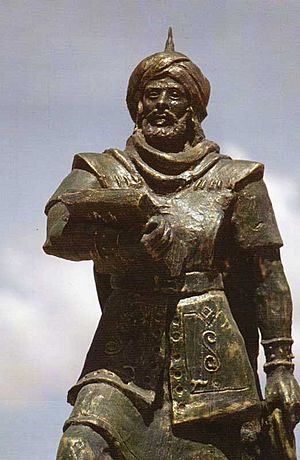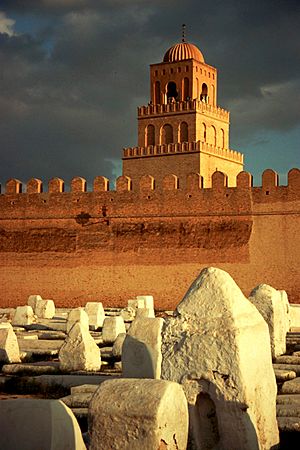Uqba ibn Nafi facts for kids
Quick facts for kids
ʿUqba ibn Nāfiʿ
عقبة بن نافع |
|
|---|---|

A statue of Uqba bin Nafi in Algeria
|
|
| Governor of Ifriqiya | |
| In office 666–674 |
|
| Monarch | Muawiyah I |
| Preceded by | Mu'awiya ibn Hudayj |
| Succeeded by | Abu al-Muhajir Dinar |
| In office 681–683 |
|
| Monarch | Yazid I |
| Succeeded by | Abu al-Muhajir Dinar |
| Succeeded by | Zuhayr ibn Qays |
| Personal details | |
| Born | 622 |
| Died | 683 Tehouda (near the oasis of Sidi Okba in present-day Algeria) |
| Resting place | Sidi Okba Mosque, Algeria |
| Relations |
|
| Children | Abu Ubayda ibn Uqba |
| Parents | Nafi ibn Abd al-Qays Salma bint Harmalah |
| Military service | |
| Allegiance | Rashidun Caliphate Umayyad Caliphate |
| Branch/service | Rashidun army |
| Years of service | 635–683 |
| Rank | General |
| Battles/wars |
*First Battle of Dongola (642)
|
Uqba ibn Nafi was an important Arab general. He served the Rashidun Caliphate and later the Umayyad Caliphate. He led the Muslim armies in conquering a large part of North Africa. This area includes modern-day Libya, Tunisia, Algeria, and Morocco. Uqba is famous for helping the Umayyad Caliphate take control of North Africa. He was also the nephew of another famous general, Amr ibn al-As.
Contents
Uqba ibn Nafi: A Brave General
Uqba was born in the year 622. As a young general, he joined Amr ibn al-As in conquering cities in North Africa. They started with Barqa and then moved to Tripolitania around 644.
After some time, a new Islamic government called the Umayyad Caliphate was formed in 661. The new ruler, Mu'awiya I, decided to continue expanding into North Africa. Uqba was chosen to lead an army of 10,000 Muslim soldiers. They marched from Damascus into Byzantine Africa, conquering many areas.
Building Kairouan
In 670, Uqba became the commander, or "emir." He led his army across the deserts of Egypt into North Africa. Along the way, he set up military camps. In what is now Tunisia, he founded a new city called Kairouan. The name "Kairouan" means "camp" or "caravanserai" in Persian.
This new city was about 99 miles south of modern-day Tunis. Uqba used it as a main base for his military operations. Kairouan quickly grew into a very important city in North Africa. It became a place for religious journeys and the capital of the new Umayyad province of Ifriqiya. Uqba chose the spot for the city's first mosque, the Great Mosque of Kairouan. This mosque was built in the same year. It became a model for many other mosques in the region and is a masterpiece of Islamic architecture.
The End of His Journey
In 683, Uqba faced a tough battle. He was ambushed by Kusaila, a Berber Christian king, and his allies from the Byzantine Empire. This battle was called the Battle of Vescera. Uqba was killed in this fight, along with his rival, Abu al-Muhajir Dinar. After his death, his armies had to leave Kairouan and retreat. However, Kairouan was later recaptured in 688.
To honor Uqba, the Sidi Okba Mosque was built as a special tomb for him in 686. The first building was simple, made of limestone. Its style was similar to some of the oldest Islamic buildings. Today, an air base in Libya is also named after him, called "Okba ibn Nafa Air Base."
Stories from History
Most of the stories about Uqba's conquests were written down much later, at least two centuries after he lived.
One of the earliest stories comes from an Arab writer named Ibn Idhari. In his book, Al-Bayan al-Mughrib, he describes a moment when Uqba reached the Atlantic Ocean. Uqba supposedly said: "O God, if the sea had not prevented me, I would have galloped on for ever like Alexander the Great, upholding your faith and fighting the unbelievers!"
Another historian, Edward Gibbon, called Uqba "Conqueror of Africa." He wrote that Uqba marched from Damascus with 10,000 brave Arab soldiers. He also mentioned that many thousands of local people joined them. Gibbon described Uqba's journey into North Africa, reaching the Atlantic Ocean. He wrote that Uqba rode his horse into the waves and looked up to heaven, saying: "Great God! if my course were not stopped by this sea, I would still go on, to the unknown kingdoms of the West, preaching the unity of the holy name, and putting to the sword the rebellious nations who worship another gods than Allah."
While there are many studies about Uqba's life and conquests, most of them are in Arabic and have not been translated into English or French.
See also
 In Spanish: Uqba ibn Nafi para niños
In Spanish: Uqba ibn Nafi para niños
- Wheelus Air Base
- Medieval Muslim Algeria
- Berbers and Islam
- Kusaila
- Early Muslim conquests
- Asid bin Kurz al-Bajali
 | Dorothy Vaughan |
 | Charles Henry Turner |
 | Hildrus Poindexter |
 | Henry Cecil McBay |


